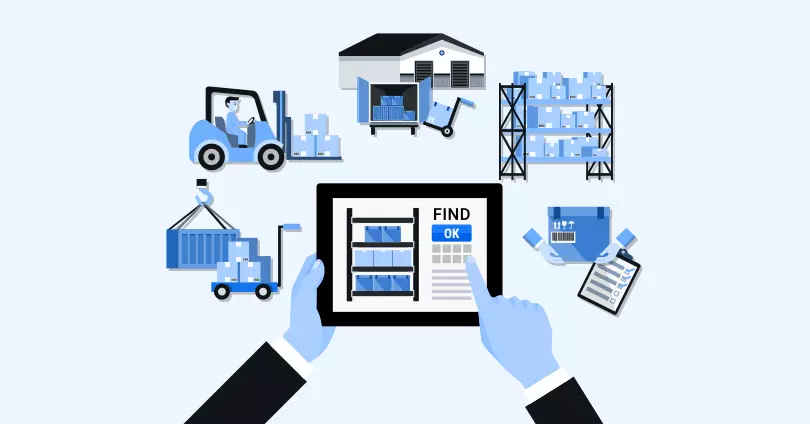Effective warehouse management is a critical aspect of any business. It involves overseeing the flow of products, raw materials, and finished goods, optimizing the use of warehouse space, and ensuring that inventory is properly managed. One of the key tools for achieving these goals is the warehouse management system (WMS).
In this blog, we will explore the benefits of implementing a WMS in your business. We will look at how WMS streamlines operations, improves inventory management, enhances efficiency and productivity, improves customer service, provides real-time visibility, and reduces costs.
Streamlining Operations
Streamlining operations involves making processes more efficient, which leads to increased productivity, better customer service, and reduced costs. A WMS helps streamline operations by automating many of the manual processes involved in warehouse management, such as receiving, putaway, picking, and shipping. This automation reduces the time and effort required to complete these tasks, and it also eliminates the errors that can occur when these tasks are done manually.
The result is a more efficient warehouse that can process orders more quickly and accurately. This leads to faster delivery times and higher levels of customer satisfaction.
Improved Inventory Management
Inventory management is critical to the success of any business. A WMS can help improve inventory management by providing real-time visibility into inventory levels and locations. This allows businesses to better track inventory, avoid stockouts, and reduce overstocking.
A WMS can also help with cycle counting and physical inventory counts, making it easier to maintain accurate inventory levels. This not only helps improve customer satisfaction by ensuring that products are always in stock, but it also reduces costs by minimizing the need for safety stock.
Enhanced Efficiency and Productivity
Efficiency and productivity are critical to the success of any business. A WMS helps enhance efficiency and productivity by automating many of the manual processes involved in warehouse management. This automation frees up employees to focus on higher-value tasks, such as improving customer service or optimizing warehouse layout.
A WMS can also help with task assignment and scheduling, ensuring that the right employees are assigned to the right tasks at the right time. This leads to better resource utilization and higher levels of productivity.
Better Customer Service
Customer service is a critical aspect of any business. A WMS can help improve customer service by ensuring that orders are processed quickly and accurately. This leads to faster delivery times and higher levels of customer satisfaction.
A WMS can also provide real-time tracking information to customers, allowing them to track their orders from the warehouse to their doorstep. This not only improves customer satisfaction, but it also reduces the number of customer inquiries regarding order status.
Real-time Visibility
Real-time visibility is critical to effective warehouse management. A WMS provides real-time visibility into inventory levels, order status, and other key metrics. This allows businesses to quickly identify and resolve issues, such as stockouts, order delays, or inventory discrepancies.
Real-time visibility also allows businesses to make better decisions about warehouse layout, inventory management, and other key aspects of warehouse operations. This leads to improved efficiency, productivity, and customer service.
Cost Savings
Cost savings are one of the primary drivers for businesses seeking to implement a WMS. By reducing costs, businesses can increase profitability and remain competitive in a rapidly evolving marketplace. A WMS can help achieve cost savings in a variety of ways, some of which we will discuss in more detail below.
Reducing Labor Costs:
One of the primary ways that a WMS can help reduce costs is by automating many of the manual processes such as receiving, put away, picking etc. With this in mind businesses can reduce their overhead costs in the long run. For this purpose consider using an inverter and other specialised equipment in conjunction with WMS to remove some of the laborious elements to allow workers to perform a wider range of tasks and effectively save money for the business.
Minimizing Inventory Holding Costs:
Inventory holding costs are another significant expense for many businesses. By using a WMS to optimize inventory levels, businesses can reduce the amount of inventory they need to hold in stock. This, in turn, reduces the associated costs of holding inventory, such as storage, handling, and insurance. By minimizing inventory holding costs, businesses can increase profitability and improve their bottom line.
Optimizing Warehouse Layout:
Another way that a WMS can help reduce costs is by optimizing warehouse layout. By using data and analytics to understand how products move through the warehouse, businesses can design layouts that minimize travel time and improve efficiency. This can reduce the time and effort required to complete tasks, which can lead to significant cost savings over time.
Reducing Errors:
Errors are another significant cost for many businesses. Picking errors, shipping errors, and other mistakes can lead to the need for rework, which can be costly in terms of time, labor, and materials. By using a WMS to automate many of these processes, businesses can reduce the number of errors that occur during warehouse operations. This, in turn, can reduce the need for rework and the associated costs, leading to significant cost savings over time.
In conclusion, implementing a warehouse management system is a critical aspect of effective warehouse management. A WMS can help streamline operations, improve inventory management, enhance efficiency and productivity, improve customer service, provide real-time visibility, and reduce costs.
One of the leading providers of warehouse management systems is Manhattan Associates. Their Warehouse Management System (WMS) is a comprehensive software solution that can help businesses optimize their warehouse operations, reduce costs, and improve efficiency. With features such as real-time inventory tracking, task management, and order fulfillment, the Manhattan Associates – Warehouse Management System can help businesses of all sizes and industries achieve greater success in their warehouse management efforts. By leveraging the power of advanced technology and data analytics, the Manhattan Associates WMS provides businesses with the tools they need to achieve a competitive edge in a rapidly evolving marketplace.
